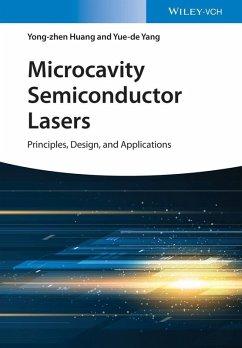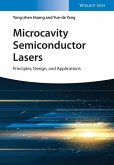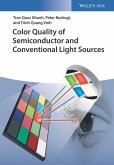Microcavity Semiconductor Lasers
Explore this thorough overview of integrable microcavity semiconductor lasers and their applications from two leading voices in the field
Attracting a great deal of attention over the last decades for their promising applications in photonic integration and optical interconnects, microcavity semiconductor lasers continue to develop via advances in fundamental physics, theoretical analysis, and numerical simulations. In a new work that will be of interest to researchers and practitioners alike, Microcavity Semiconductor Lasers: Principles, Design, and Applications delivers an application-oriented and highly relevant exploration of the theory, fabrication, and applications of these practical devices.
The book focuses on unidirectional emission microcavity lasers for photonic integrated circuits, including polygonal microresonators, microdisk, and microring lasers. After an introductory overview of optical microcavities for microlasers and detailed information of the lasers themselves, including mode structure control and characteristics, and lasing properties, the distinguished authors discuss fabrication and applications of different microcavity lasers. Prospects for future research and potential new applications round out the book.
Readers will also benefit from the inclusion of:
Perfect for laser specialists, semiconductor physicists, and solid-state physicists, Microcavity Semiconductor Lasers: Principles, Design, and Applications will also earn a place in the libraries of materials scientists and professionals working in the semiconductor and optical industries seeking a one-stop reference for integrable microcavity semiconductor lasers.
Explore this thorough overview of integrable microcavity semiconductor lasers and their applications from two leading voices in the field
Attracting a great deal of attention over the last decades for their promising applications in photonic integration and optical interconnects, microcavity semiconductor lasers continue to develop via advances in fundamental physics, theoretical analysis, and numerical simulations. In a new work that will be of interest to researchers and practitioners alike, Microcavity Semiconductor Lasers: Principles, Design, and Applications delivers an application-oriented and highly relevant exploration of the theory, fabrication, and applications of these practical devices.
The book focuses on unidirectional emission microcavity lasers for photonic integrated circuits, including polygonal microresonators, microdisk, and microring lasers. After an introductory overview of optical microcavities for microlasers and detailed information of the lasers themselves, including mode structure control and characteristics, and lasing properties, the distinguished authors discuss fabrication and applications of different microcavity lasers. Prospects for future research and potential new applications round out the book.
Readers will also benefit from the inclusion of:
- A thorough introduction to multilayer optical waveguides, the FDTD Method, and Padé Approximation, and deformed, chaos, and unidirectional emission microdisk lasers
- An exploration of mode analysis for triangle and square microresonators similar as FP Cavity
- Practical discussions of mode analysis and control for deformed square microlasers
- An examination of hexagonal microcavity lasers and polygonal microcavities, along with vertical radiation loss for 3D microcavities
Perfect for laser specialists, semiconductor physicists, and solid-state physicists, Microcavity Semiconductor Lasers: Principles, Design, and Applications will also earn a place in the libraries of materials scientists and professionals working in the semiconductor and optical industries seeking a one-stop reference for integrable microcavity semiconductor lasers.
Dieser Download kann aus rechtlichen Gründen nur mit Rechnungsadresse in D ausgeliefert werden.









